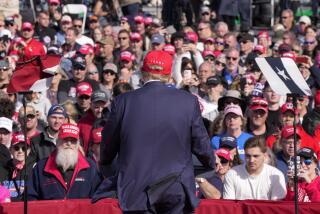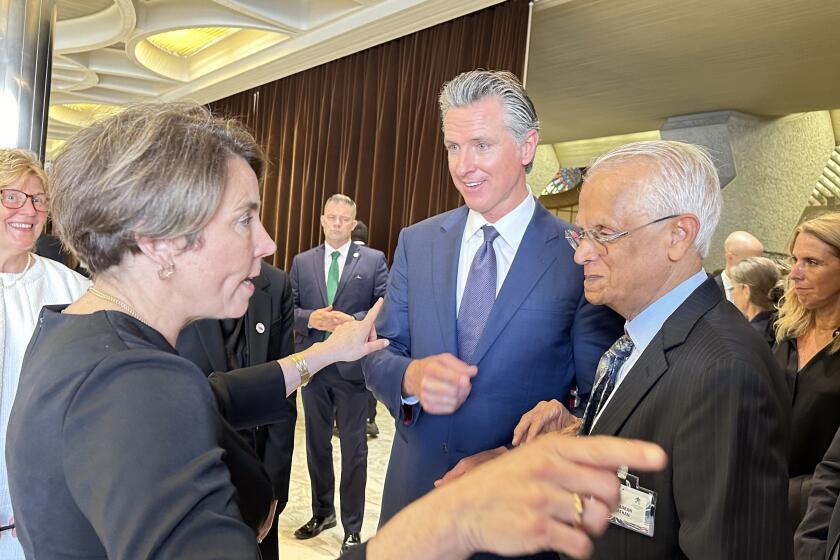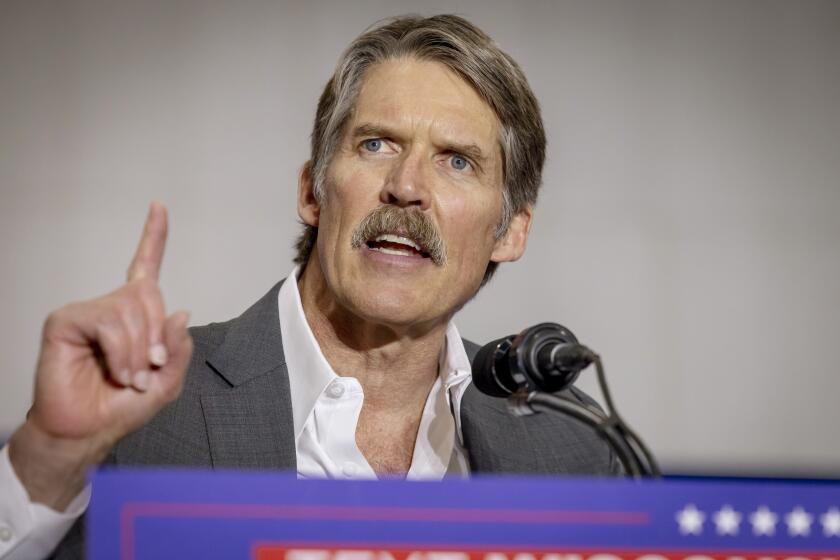Reporters See Perot as Object of Derision : Campaign: Texan’s acts are questioned and his word seems suspicious. He is far behind in the polls and fading from the news.
Brit Hume of ABC News pushed into the elevator at the Bush reelection campaign headquarters scowling.
“If you want a story about the media, how about the way we’re lying down for this guy in Texas, who probably is not going to win anything anywhere. It’s irresponsible.”
As the elevator traveled six floors to the street, the gang of reporters inside mumbled agreement.
Actually, they were only half right. For more than a week, Ross Perot did dominate much of the news coverage--teasing the press about entering the race, coercing delegations from the other candidates to see him in Texas, then, after hearing what they had to say, getting in anyway.
For George Bush, who was trying mightily to catch up in the presidential race, it meant another week in which his message was not shaping the agenda.
But since Perot got in last Thursday--even while the amount of coverage was larger than polls suggest his impact will be--the Texas billionaire has become an object of derision to the press corps so crucial to his credibility.
“I think he’s a pathetic figure, and I think that’s the way he’ll go down, as an asterisk in political history,” ABC’s Sam Donaldson said Sunday.
“HE’S BACK!” shouted the cover of Time on Monday, recalling a phrase from a popular horror movie to suggest Perot was some kind of monster.
Bryant Gumbel on the “Today” show Monday seemed tired of Perot’s favorite homilies even before his interview with the on-again candidate began. “Where the rubber meets the road, all that other stuff, let’s get that out of the way right up front,” Gumbel began.
The reaction says something about the way the media filter operates. After all that has happened, after all that Perot has done, “it is as if the press has decided that he is temperamentally unfit to run,” ABC media analyst Jeff Greenfield said.
Perot never fully disappeared from the race. He remained on the talk show circuit, particularly on NBC’s “Today” and CBS’ “This Morning,” pushing his book, a plan to cut the deficit.
Then 10 days ago he took fuller control of the nightly newscasts at which so much of the campaign is aimed, when it was learned that he had persuaded influential delegations from Bush and Democratic nominee Bill Clinton to talk to his volunteers on Sept. 28.
But before long, the press was beginning to question some of Perot’s actions. NBC’s Mike Jensen last week profiled the deficit reduction plans of the three candidates, asking eight Nobel laureate economists to scrutinize them. Five picked Clinton’s. Three picked Bush’s. None picked Perot’s.
On ABC, Bob Jamieson similarly concluded that most experts agreed “the program should not be implemented now” because the economy is too weak.
Last Monday, Greenfield compared Perot to the notorious fraud Rosie Ruiz, who pretended to win the Boston marathon some years ago by skipping the middle of the race and taking the subway instead.
By Wednesday, CBS’ Scott Pelley and ABC’s John McWethy were revealing that Perot’s claim that he was waiting for his volunteers to tell him to run was an elaborate charade. McWethy quoted former Clinton supporter Cliff Arnaback as saying Perot told supporters in July, “Anyone who thinks I’m quitting may be in for an October surprise.”
Pelley found that 10 of Perot’s volunteer state coordinators were actually paid, and that Perot had spent $56,000 on private investigators to spy on some of his volunteers--then tried to hide the expenditures on his Federal Election Commission disclosure forms.
Other news organizations later found the firm was paid even more.
On Thursday, all three networks broke into their regular programming with special reports to air Perot’s entry live, something no other candidate has enjoyed all year, including the President.
But by Friday, the day after Perot entered the race, the Texas billionaire was no longer getting even a third of the coverage. Bush and Clinton announced their debate schedule. And all three networks led their broadcasts with analysis of the new unemployment figures, which dropped slightly because roughly 80,000 Americans gave up looking for work.
Over the weekend, the immutable grinding rules of politics were already starting to take hold. Bush and Clinton went out campaigning, with the press in tow. So the press did stories about them--but not about Perot, who stayed home for three days.
Finally came the polls, and they suggested that Perot had no impact on the race. In the CNN-USA Today-Gallup poll, Clinton was ahead of Bush by 10 points--the same as before Perot entered.
ABC and the Washington Post found on Monday that Perot actually dropped 5 points by entering, from 14% to 9%. The latest Los Angeles Times Poll, released today, put his support at 9%. And the New York Times and CBS found, incredibly, that only 7% of Americans still had a favorable impression of Perot, contrasted with 59% who viewed him unfavorably.
It is difficult, if not impossible, for a candidate’s vote total to exceed his favorability rating.
Now Perot has receded even more. By Monday, Newsweek’s cover headline said: “Ego Trip.” The dominant news in newspapers and television Monday was Bush’s failure to sustain his veto of the cable bill, the first veto override in 36 tries. CBS examined the ad wars between Bush and Clinton. ABC examined the history of divided government to test Bush’s argument that it was to blame for his inability to pass his agenda.
What happened is not that complicated.
Boston Globe columnist Tom Oliphant thinks the press seized on Perot because the race had become stable and a little dull. “Any fresh perspective, you clutch at it like a life preserver,” he said.
But the venomous tone of the coverage reveals something else.
Perot’s candidacy has also been a challenge to the traditional press from the beginning. He campaigns by talk show, attacks reporters openly and skipped the middle of the race, when he was about to undergo serious scrutiny.
Over time, “the things that made him attractive to the public began to make him suspect to the press,” Greenfield of ABC said. “He played by different rules.”
By the time Perot dropped out, many reporters had learned things about Perot, and were ready with stories about his past, that cast doubt over his account of himself. One of those was a pattern of dissembling and deception that they believed was reaffirmed by the way Perot returned to the race. The polling of his organization seemed a ruse. His volunteers were paid. When reporters called his 800 number, they found they were automatically counted as urging him to run.
“He lies all the time,” one network producer who covered Perot said.
Perot says he does not want to play spoiler, but then enters a race with a month to go that he has no realistic chance to win. It makes his word seem suspicious.
Finally, American Enterprise Institute political analyst William Schneider said, the press has turned negative on Perot because they see him as an egotistical amateur fooling with the process.
“This is the contempt of people who respect professionalism,” Schneider said, and “they respect the process.”
More to Read
Get the L.A. Times Politics newsletter
Deeply reported insights into legislation, politics and policy from Sacramento, Washington and beyond. In your inbox three times per week.
You may occasionally receive promotional content from the Los Angeles Times.






